THE POET AS FRAUD: A COMPOSITE
By Stephen Oliver
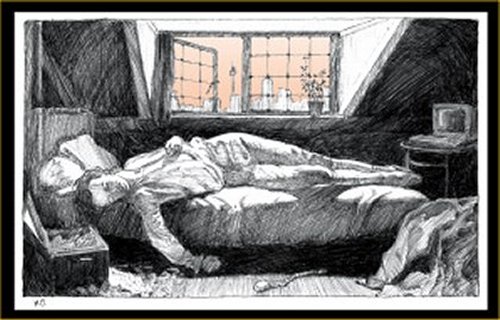
[Above] Unmanned cover image in part. (Artwork by Matt Ottley, year unknown)
'Contempt in courts and cities dwell,
No critic haunts the poor man's cell',
- Robert Herrick
You must first recognise your man. I say 'man' because the poet is emotionally an androgyne, and I nominate the male gender because, traditionally, this is where the greater number of poetasters, poseurs and confidence tricksters prevail. A circumstance that has something to do with the amorphous nature of poetry, especially when one departs from traditional forms. Any attempt to employ these structures by the uninitiated too quickly exposes those selfsame practitioners as either provincial typing instructor, school mistress, or bookish academic intent upon building verbal monuments to him or herself, contradicting Johnston's homage to Shakespeare Thou art a monument without a tomb - by paying dues to a moribund Augustan age and writing endless screeds in the manner of Alexander Pope along the lines of, 'As I gazed on the Palladian hill / My thoughts toward Horace, Virgil, and Bill /' or scanning and attempting to emulate the classical stylistics of someone like A. E. Housman, and his A Shropshire Lad. For such a person, The Great War happened in someone else's backyard and time stopped with Rupert Brooke - though not because Brooke was [in essence] a comic poet. This he fails to see.
No, our man is the quintessential modern man and is, quick as a jack rabbit, already up and running. The best thing that might come his way is the middle class expectation of measurable success, prestige and political opportunity offered him by an Arts degree and appointment to an English department in a leading city university, election to the editorial ranks of the University Press and Art and Funding bodies. He doesn't consider himself a seer, but instead something of a missionary, his dutiful obligation to impart knowledge and learning to the undergraduate - and in some politically incorrect instances, to the female undergraduate. There are to be observed, therefore, innumerable variations on a theme.
The composite poet in his academic incarnation plans well in advance; he establishes his own Creative Writing School affiliated to the English Department of a leading university in one of the capital cities. This allows him to clone a beehive of disciples created in his stylistic image, whom he can then relocate strategically around the country in positions of political influence; readers of poetry manuscripts in leading university publishing houses, book reviewers for leading metropolitan dailies, and literary magazines and other organs of 'persuasion'.
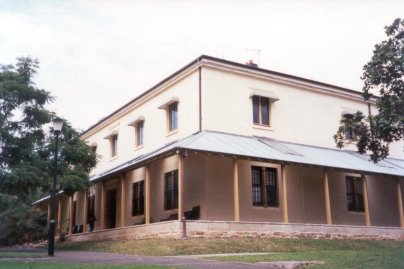
|
This ensures the survival of his poetic 'blood line' (his clones are rewarded with publication, residencies and grants) and kills off at root any counter-force or creative individualism which may, if allowed free rein, contest his position in the public arena - his stranglehold on the country's poetic future. Again, he might have found that the freedoms of the '60s gave him his head, as it were, and his early twenties afforded him innumerable roles and guises in which to ply his trade as narcissist and arch sexual opportunist. |
[Above] Inner City Quarantine Station for Poets (Photo by Stephen Oliver, 2002)
He probably went to training college and got a diploma to teach in secondary schools, but only in the capacity of an Arts teacher - an indeterminate role set up in the mid-sixties because the climate allowed for such things; for instance, open-plan and experimental modes of teaching. So many individuals with questionable credentials secured these positions by strategically befriending certain poet-teachers located within the administration centres of capital cities. At the right time, and in Australia - this was during the Whitlam era - you could slip through the mesh without offering, one way or another, any defined syllabus or tried and tested knowledge on the subject. The Visual and Creative Arts as a subject was as vague as you could possibly hope for. Anyway, once safely ensconced within the bureaucratic system, and registered as a permanent teacher 'on art subjects', his career and superannuation entitlements were secured for life: he could now cruise on a sinecure. He would risk nothing.
Had he come from an earlier generation, say the '50s, then a career bureaucrat would have been one of the few options open to him in New Zealand; the Education Dept in an administrative capacity, or some other government appointment, maybe even a role in the Ministry of Energy - formulating educational programmes for trainees. Years of writing inter-departmental memos would equip him with a prose style ready-made for book reviews and little critiques on current literary theory. This is a man (or woman) who runs with the hounds and always backs what he considers a winner in the literary stakes. He will take few risks and will guard against jeopardising his standing, which on most things is ambivalent. He promotes the young, up-and-coming writer, the leaders of the new and emerging generation.
In this way, he invests in his own literary career by shoring up support amongst the young, and against those in the establishment institutions who regard him with happy indifference. If the emerging writer doesn't show [in due time] signs of fulfilling his or her promise as a person with literary and political clout, and who doesn't appear to have been accepted by the leading clique of the day - then that person is just as quickly abandoned for one who does. Our man cannot afford to be seen compromising his public face by supporting anyone other than those who are seen as gaining positions of political leverage at speed. This is done in the sure knowledge that his literary endeavours are far from laudatory, having remained on a plateau of mild but ineffectual achievement for decades.
His prose style is at once 'positive' but non-committal, underplaying the salient points of the author's strengths by patronizing his 'agreeability' within the existing pantheon of writers; a style in which he appears to say something, but in effect, is giving away nothing. This man has all the nonce of a well-seasoned old campaigner and knows how to hedge his bets with the best of them. His weekend hobby is restoring old valve radios.
Nonetheless, at this point he has discovered that an 'act' or 'image' is pretty much the order of the day. But which one - who is the best role model? He tries a couple of combos; beat and/or beatnik, pipe and horn-rimmed specs, frantic artist - huge canvases sprayed with paint pots - and for a while it's fun riding a bicycle over them, and selling them off a la Pollock as bona fide works of neo-abstraction: Cyclical Series No: 1 Reclining, and Cyclical Series No 2 Awakening. Henry Miller (he has read the Tropic of Cancer) is invoked as his sexual guru and liberator. He buries himself in the grid system as 'a cage for the tortured soul', but this form demands true vision which obviously he does not possess - despises, in fact.
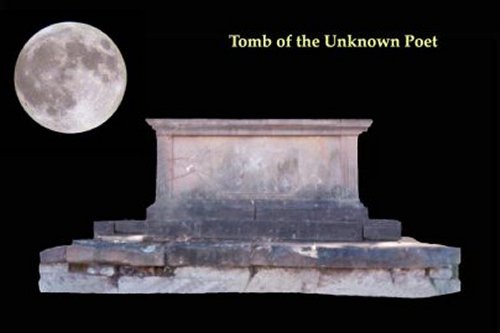
[Above] tomb of unknown poet (Photo by Stephen Oliver, 2002)
Finally, as he does not suffer from either a bi-polar or schizoid disorder, and isn't on the requisite 'medication' which he believes is integral to this role, he feels that there is little advantage to himself in continuing with that particular charade, and so abandons it. Besides, the huge quantities of alcohol that must accompany this stance are by far too ruinous and would soon blunt his opportunistic edge. The one thing that demands consistency is great cunning and an unflagging vigilance. After all, emptiness is a very big thing to hide. And never let a chance go by babe, especially where women are concerned.
He must conserve his energies in order to impress on a long-term basis. For charlatanism to be successful, it can only operate under a guarded and inner watchfulness well-hidden from one's opponent. And almost everyone is an opponent unless they have otherwise declared themselves a 'disciple' or, by constant example, acted in a manner conspiratorially sympathetic with his more sinister side. An exchange of negative insecurities, a shared hatred, a sleazy conspiracy, is collateral enough. This is his inner sanctum which must remain hidden from view at all costs. He adopts a mask that appears to be passive, non-threatening - but it is little more than a screen over a churning anger at the very core of his being which nevertheless continues to feed upon itself. In order to maintain this cloaked and 'true' personality, he must assume an act or persona that he can sustain with minimal effort; he must to all outward appearances seem the very picture of laid-back elan and cool - an act which must go the distance if he is to be successful in his predatoriness.
Yet it did not take him long to discover that he was not in fact a visual artist, no matter how many times he mentioned Francis Bacon or Diego Rivera at dinner parties. Monumental sculpture was something he associated with boisterous women in boiler suits, armed with raucous voices and hairy legs - and if the occasion so much as smelt of challenge, that wasn't for him. At any rate, if Jack Kerouac could get down a few syncopated words to jazz rhythms, [Marlon Brando had pretty much cornered the market on a brand of feminine/macho sexuality which appealed strongly to his deep-seated bi-sexuality] then, so too could he. All he had to do was get the hip dialogue down pat and act the part. The benefits of this were principally that you didn't actually have to read or study the relevant literature to any great extent, you just had to know about it (a touch of Charles Bukowski was a sure bet) and that's about as much as most of the social set were doing anyway.
The rest could be filled in with a close network of 'associates' who were trying to pitch a similar thing - usually with concrete, found and colloquial, or open-form poetry backed up with a few screen printing techniques, and by paying close attention to current fads and viewpoints expressed by the leaders of any one or other artistic movement. Poetry under these conditions is seen as something akin to a brand name or fashion statement. To anybody entertaining such a career path, a few helpful hints may be in order: if you live in New Zealand, a smattering of Pacific Island Culture (especially, if you live in Auckland) and a passing knowledge of Maori etiquette helps a great deal, especially if you can correctly pronounce place names - start with Maori streets names and work your way through to the small towns and local landmarks. Namedrop a few up and coming indigenous artists to adequately display your current interest and ethnographic sympathy.
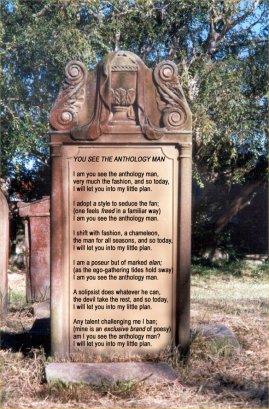
|
To sound a cautionary note though, what ever you do, don't write as an authority on Maoritanga. This defies all current 'politically correct' notions dealing with cultural appropriation. You run the risk of having your house burnt down by marauding activists. It is advisable under these strict cultural conditions - not to mention the clear threat to your personal safety - to write only about your own domestic comedy; drinking, mind games, dope-smoking, careerist ambitions, and inter-sexual politics: to preside as the somewhat removed voyeur, in other words. If you live in Australia, show empathy for indigenous land rights in a non-demonstrative way, especially at generic art functions - if possible, formulate a working interest in aboriginal culture, especially, the art schools associated with the various nations of that continent. A scorched earth, Garden of Eden. The advantages here of such smart moves are that you may secure funding from Arts and film institutions to make a short film on the subject Desert Art at City Prices.
This opens up all sorts of remunerative possibilities (keep an eye to the video market) for long term tenures and residencies, plus travel opportunities and, maybe, a showing at the Sundance Festival. |
[Above] Tombstone. An angst of Anthologists (Photo by Stephen Oliver, 2002)
If you can pull this off, it won't be long before you are awarded your first bottle of Grange Hermitage from appreciative Paddington Gallery owners and collectors; indeed, if you play your cards right, you might even procure an original and signed limited edition print from a leading and authenticated aboriginal artist, which you can then hang prominently to view over your rustic, whole-earth-wooden dinner table.
But our man [or perhaps man-woman] the public servant, must, like every true bureaucrat, have a hobby - must act true to type; it could be building valve radios or vintage car-spotting. His well-publicized artistic pursuits on the indigenous front has nothing whatsoever to do with cultural preservation - only the preservation of his continuing employment prospects. The entire thing is a deep charade. It is his attempt to secure a retirement package, the fabled superannuation, and nothing more save a little self-aggrandizing along the way. Oh, the biting fear of discovery!
And so by degrees he fails into meanness. He achieves optimum ordinariness. As an Australian, you will be aware that Sydney is the best place to set up such a rort. Sydney is a town where people can freely believe in their own bullshit, and everyone is prepared to believe it along with you; this mutual acknowlegement demands a fine balancing act, a peculiar generosity. To not play this game, that is, to be honest in a supplicating way, is to be made anathema - become social outcast as opposed to an acceptable social pariah. Once you've got that procedure under control, from thereon in social success is a summertime breeze, a mere formality.
The object lesson here is: seen to be seen. Especially with women, [again] women as sexual object. Women as acquisition. Any woman is fair game; no mercy need be shown to other people's wives - 'when we first met on the bus, man, it was "good morning" - and wasn't long before it was - "good morning darling"' - and, unhesitatingly, anybody else's girlfriend. Women are paramount in all these social manoeuvres, they belong to that social code of prestige by which our 'composite poet' measures others, and in this light he regards women as trophies, as living endorsements of his own self-gratifying ego, while the businessman by contrast, not quite as 'enlightened', would regard them in similar circumstances as mere ornaments, or personal servants.
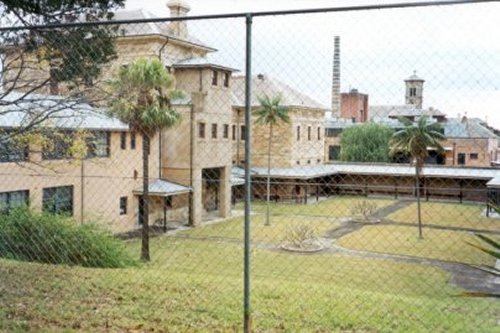
[Above] Exercise yard for high risk poets (Photo by Stephen Oliver, 2002)
As to the teaching profession, students saw through his act in an instant, and realized that he was simply out to impress with image sans substance. But then, secrecy and duplicity were important weapons in maintaining the illusion of the hip and the cool designed at least to give the impression that he was actually someone. This had the effect of compounding his authoritarian personality in the work place and, especially, at dinner parties around his 'rustic' table, and these 'literary' gatherings he invariably orchestrated on his own turf. He therefore became the control freak - put-downs and power plays were the one sole currency. On those few occasions when he had to attend various other social gatherings - writers' centres, or the obligatory literary function, he would act the flaneur (let the 'chicks' come to him) be noticed by all means, but never appear to be the slightest bit ruffled, or at least, not in public. His androgynous disposition displayed itself in a bitchy undermining of other people's achievements (which he obviously felt threatened by) and in unaccountable eruptions of anger - like sun spots from the core hatred of his being - especially as he got older, but only on a one-on-one basis, that is, if he thought he could get away with it without witness. The school-yard bully in his element.
The truly gifted, who refused to present a mask to the world, he loathed like no other. By way of a counterweight, he was regarded in the school staff room with intense distaste - especially by the up-and-coming (very PC) young gay and progressive teachers, well informed and out to make a name for themselves. Usually distinguished by either red or blue-rimmed designer spectacles. Nonetheless, careerist to their bootstraps. He was as relevant to them as an outdated combine harvester - something left over from another age; an irrelevancy - a free loader from the Whitlam era, when funding was thrown at anybody who cared to call him or herself an 'artist', which launched the careers of many a 'successful' and mediocre talent.

[Above] Poet in Residence No: (2) (Photo by Stephen Oliver, 2002)
In short, our man seen as a dinosaur. Such a charge he would readily admit to - if for no other reason than to give himself the air of the misunderstood working class hero. Still boasting the alternative outsider he never in fact was. Although his presence in the teaching profession was detested by student and teacher alike, much as one would an abandoned corpse in a hospital corridor, the sentimentalist in him (such is the emotional fascist at heart) wished it were otherwise.
Next, he must choose the correct location to live in and to give credence to his image. Gentrified working class inner-city suburbs meant that you sided with the lumpen proletariat, the working class bloke and the working class ethic. Your brand of coffee and choice of wine might suggest to the reader of Village Voice - or even the New York Review of Books - the consummate host and connoisseur. This could be forgiven (understandably, not every one could successfully aspire to the lofty heights of a Robert Hughes) under the guise of bohemian generosity, and in establishing a reputation within your small neighbourhood as an hospitable, though not recognizably sartorial host.
 
[Above Left] Poets In Residence No: (3) (Photo by Stephen Oliver, 2002) [Above Right] Poets In Residence No: (2) (Photo by Stephen Oliver, 2002)
Our poet had to remember that 'contrivance' must appear haphazard, casual. He dressed down. As to the suburbs and environs, the choice came down to: in Sydney, Rozelle, Balmain and the Blue Mountains - or he may even consider a 'house-boat' on an 'unpolluted' waterway, (the arch sentimentalist disguised as the arch lyricist) if indeed he can find both, which would set him up nicely with a title for his first volume of memoirs; in Melbourne, Clifton Hills, Brunswick and Apollo Bay - yet the migratory paths along the east coast of Australia is a two way flight path - and he might decide (use-by date: mid-30s) to head toward Byron Bay, or up to Mullimbimby to nurture sweaty dreams of breeding and/or leaping upon the nearest politically correct eco-bandwagon; in Wellington, Mt. Victoria, Newtown, Island Bay and Paekakariki; in Auckland, Ponsonby, Grey Lynn and Piha, and extending as far as the Coromandel [home of the legendary, albino possum] peninsular.
He did not consider himself a prolific writer, producing just enough 'cut & paste' and 'collage' verse to maintain a social profile. His first book titled, Getting It Up For You, was published in the late '60s through the Woof & Weft Press who then put out regular small print runs of poetry to an even smaller readership. This book celebrated the sexual game playing associated with the 'woolly' idealism of that era, and served as a record of his real and imagined conquests within a radius of, maybe, five kilometres. Sort of a dirty bomb poetic. Strategies, parties and ruses planned before the narcissistic backward-looking gaze of his bathroom mirror. One poem from this collection will serve as a fairly typical example of the style:
HEY BABE!
Anyway, no way
so I said to Nicole
'Stay!' don't go (for the day)
oh, what a night
let me take you down to the river
between your thighs
babe, let my love flow
& do you see stars in your eyes (ha)
still?
(Yeah) so don't go
help me up by my love handles
'cause love is in the air
& cous cous on the menu
so I said to Nicole
'Stay!' don't go (for the day)
oh, what a night
but by then she had split.
This is perhaps his most anthologized piece and contains about all anyone needs to know about his philosophy on life, such as can be deduced. Rarely would he submit a poem to the small literary magazines because such an attitude he considered too demeaning - unless of course he was approached by the editors - and this remained the state of things. At any rate, his work appeared in very few literary magazines during the intervening periods between publishing two or three books with titles like (aside from the one already mentioned) Bird Dog Man, Bad Bitch Poems and, maybe, I Dreamed I Was A Jazz Giant published over a period of about 30 years.

[Above] Urban Poet Series: Pavement of Broken Dreams (Photo by Stephen Oliver, 2002)
Anthologies were the prestige publications he sought, believing that this provided irrefutable evidence of his prominent contribution to generations of hip poets, and the legacy of literature generally. The fact that anthologies paid a bare minimum to poets for their inclusions, and served as a ready-made money spinner for large publishing houses who might be fortunate enough to market through the education and library systems - with an outside chance of international distribution - didn't particularly phase him in the least. Given his narrow-band view of life, anthologies represented acceptance by an upbeat clique, and something he elevated in his own mind to the status of privilege. As the author of this essay has written:
YOU SEE THE ANTHOLOGY MAN
I am you see the anthology man,
very much the fashion, and so today,
I will let you into my little plan.
I adopt a style to seduce the fan;
(one feels freed in a familiar way)
I am you see the anthology man.
I shift with fashion, a chameleon,
the man for all seasons, and so today,
I will let you into my little plan.
I am a poseur but of marked élan;
(as the ego-gathering tides hold sway)
I am you see the anthology man.
A solipsist does whatever he can,
the devil take the rest, and so today,
I will let you into my little plan.
Any talent challenging me I ban;
(mine is an exclusive brand of poesy)
am I you see the anthology man?
I will let you into my little plan.
The American critic and poet, Dan Gioia's commonsensical essay, Can Poetry Matter, first appeared in The Atlantic Monthly, in May 1991. In it, he contends that poetry has become a sub-culture that has lost its link with a wider, reading public and is now relegated to academic institutions and the endemic factories of 'poetry-as-product' known as creative writing courses. His essay immediately precipitated reaction and counter-reaction from teacher-poets and literary critics alike. His remarks on poetry anthologists I find unerringly relevant and satisfyingly instructive:
A clubby feeling also typifies most recent anthologies of contemporary poetry ... More than one editor has discovered that the best way to get an anthology assigned is to include work by poets who teach these [creative writing] courses ... many of these anthologies give the impression that literary quality is a concept that neither an editor nor a reader should take too seriously. The editorial principle governing selection seems to have been the fear of leaving out some influential colleague. The poetry subculture no longer assumes that all published poems will be read. Like their colleagues in other academic departments, poetry professionals must publish, for purposes of both job security and career advancement.
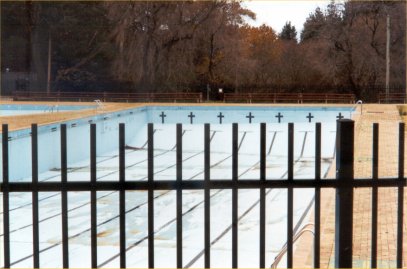
|
The more they publish, the faster they progress. If they do not publish, or wait too long, their economic futures are in grave jeopardy. The slow maturation of genuine creativity looks like laziness to a committee. Like subsidized farming that grows food no one wants, a poetry industry has been created to serve the interests of the producers and not the consumers. And in the process the integrity of the art has been betrayed. Of course, no poet is allowed to admit this in public. |
[Above] Poet's Olympiad (Photo by Stephen Oliver, 2002)
However, such beneficence is yet to be bestowed upon our man. So, to return to the profile. At intermittent periods throughout his career, and according to the fashion of the moment, he will produce the occasional cyclostyled or Gestetner literary magazine (collated and stapled at his rustic dinner table) with a careful blend of women and post-beat writers, though mostly emerging, and young women writers - a tokenism offered up by the 'boy's club' to offset criticism of nepotism - the gamble being that one or two will become famous down the track, thereby ensuring literary and historical relevance in the great scheme of things, with short, informal poems reminiscent of a telephone-speak, and hip self-help snippets from real estate and travel advertisements, smirky off-the-wall and zany personal contact notices like 'Fun loving Sagittarian seeks leather-clad chanteuse for meaningless relationship', revamped Robert Crumb and Archie-type cartoons, mixed in with found and concrete poems, list poems, urban cowboy and anti-intellectual poems, dope and dada poems, poems about oral sex and poems about the oral tradition in a bleary-eyed production of retro '60s nostalgia and bric-a-brac couched in a North American patois with a flavour of 'throw-away' disposability about it; a Poets' Digest of small-town flapdoodle.
It should be noted here that although Dana Goia states in his new Introduction To the Tenth Anniversay Edition of Can Poetry Matter?(August, 2002, Graywolf Press) that a good deal has changed for the better in the promotion of [American] poetry, and that it now reaches a broader democratic base than ever before through radio programmes, festivals, newspaper columns, the internet, etc, (the same largesse, however, does not apply to the Australian poetry scene where the opposite appears to be happening. Beyond the academic institutions, he notes, too, 'that the state of poetry criticism and reviewing remains deplorable.'
Understandable really, when you consider that the conservative mind will invariably react with fear - even hatred, when challenged; this applies to a particular underclass of book reviewer happy enough to pass off ill-considered opinion and ignorance as informed, critical judgement. The democratic process may be the 'guardian of free speech', but it simultaneously lets into the backyard of bias, bigotry and personal agenda. And the biggest backyard operating at present is the internet.
So then, these magazines might run to maybe five or six issues over a two year period and then fold. A banner title would sound an attitude in the manner of STOKED [or] GET OVER IT, BUKOWSKI'S BABY - even, dare I say it, published under the imprimatur, WAY COOL UNLIMITED. This proves to be an effective DIY exercise using outdated technologies which elicit a peer-group nose-sniffing and an indulgent, passing interest amongst the younger literati. However, as a ploy in drumming up pre-publicity for his next book of poems, advertising and selling through public readings and putting in for literature grants, this works well enough.
This is no answer to such institutionalized national magazines like The New Zealand Listener, for instance, and, increasingly, celebrity coffee table magazines like The Australian Book Review - or any number of assorted dailies with their 'token' book review supplements (little more than outlets for 'establishment' book publishers, those stooges of the multi-nationals), tired old matriarchs of the mainstream, limping dowagers of conventional taste still aping the mannerisms of post-second world war literary mores like the 'New Statesman' or the 'Spectator'.

[Above] Urban Poet Series: River Styx. Urban tributary. (Photo by Stephen Oliver, 2002)
Yet groaning under the weight of precious advertising copy, outdated cryptic crossword puzzles, and celebrity interviews, stricken by interchangeable book review editors who align themselves in the most partisan fashion to popular taste, whose editorial judgements often as not are informed by 'suspect' third party recommendations, and the dirty politics of the literary rumour-mill. Journalist hacks who wouldn't know a bard from a Buick, an ode from an omelette. Journeymen, without a creative bone in their bodies, whose cultural refinement exists in an uncanny ability to kowtow before the established presses of the day, and to take advantage of every A-list dinner party thrown their way by the self-proclaimed, 'official' arbiters of public and literary taste. Such an editor is the equivalent of a 'rent boy' within the literary industry. It is provincialism taken to its snobbish extreme - easily associated with quasi-European centres like Melbourne, for instance.
Australia, geographically the larger of the two countries, will dismiss the artist out of a causal indifference, New Zealand, the smaller, out of unambiguous malice; the first is attributable to an expansive yet cultural looseness, the second to a narrow and self-conscious insularity. I had observed in an early poem, Welcome, To The Pace Train [in] Guardians, Not Angels, (1993), that New Zealand reminded me of 'a country shaped like a broken handgun' - on reflection, it is a little more ragged round the edges, closer in shape to that of a half-gnawed chicken bone. For me, coming to Australia in the mid '80s, it was more a case of leaping 'out of the fire' into the 'frying pan'.
Our composite poet (and he is, necessarily, a chameleon) might have diverged slightly in career paths though he is governed by much the same motivation; and it must be remembered that poets share much the same mildly psychotic condition, 'don't trust your fellow poet and better him or her at every given opportunity' - petty jealousies are exacerbated in part because there is very little money in the way of grants, or not enough monies to go around, and even fewer publishing opportunities open to poets; they are tearing themselves apart over the same old mouldy bone. Unless he is an academic - something of an El Dorado to the poet.
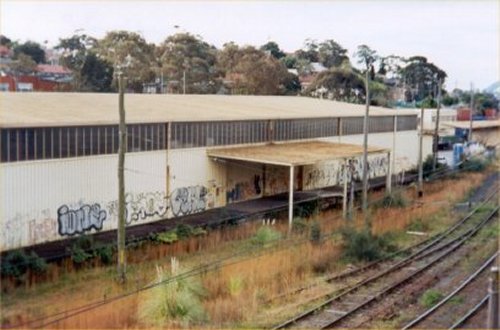
[Above] Poets inner city train-station (Photo by Stephen Oliver, 2002)
Travel, money, power, authority are at his fingertips. Alternate options for the non-academic poet are school-teacherly positions, petty bureaucrat in a government department [drainage or engineering], an assistant editor in a small publishing house, journalism (for the mid-career poet), copywriting (for the younger poet). And of course the ubiquitous creative writing institutions - adjuncts of the university English Department.
If he has had dealings with the visual arts as critic he may chance an appointment at a 'Museum of Contemporary Art' and happily cease to write altogether. Composite poet number one. This means that, after an absence of a decade or so, he can then burst back upon the scene with a new book (and remember, our man is a consummate chameleon) and depart the Art Museum like the Pharisee rending his garments on the steps of the temple, imploring his God (and the book buying public) to forgive him his adulation of false idols and the promulgation of sophistries which fooled an entire, now aging generation.
He proceeds then to claim allegiance with the classical traditions - but who? Juvenal and his Satires, Catullus, the Odes of Horace, (no, done to death by all and sundry), Virgil's Georgics or Theocrities Idylls - hardly, he lives in a country altogether smothered in sheep (as are both Australia and New Zealand) and this would leave him feeling bloated and quite claustrophobic. Something with a rational edge is called for to temper those unaddressed issues of family, and hitherto disregarded filial sensitivities in previous works. He settles on a combination of four Roman poets of the Augustan Period: Propertius and his 'choleric intensity', Ovid and his 'sanguine coupling', Virgil and his 'phlegmatic musings', and Horace, with his 'melancholic equipoise'. For here we have, as Joseph Brodsky so neatly put it, the standard representations of the four known humours.
Unfortunately his collection, titled Cantos for Connoisseurs, proves to be at once flat and prosaic, sickly sweet, and in his attempt at gravitas and sincerity, mere block sentiment. His knowledge of traditional forms essentially only goes back to Ezra Pound! Not for him (and I paraphrase the Robert Graves edict) 'the wastepaper bin is the writer's best friend'. Yet like many poets of his generation, he had simply picked up on 'attitude', a synonym for what is dernier cri - and not the discipline which informed it; his work, therefore, exhibits a cardboard, two-dimensional perspective. A brand-new dishonesty.
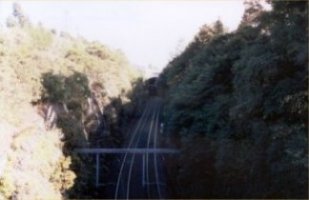 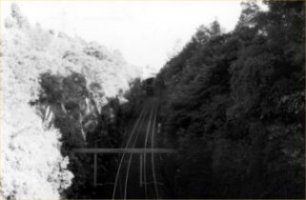
[Above Left] ..through Valley of Shadows (Photo by Stephen Oliver, 2002) [Above Right] ..through Valley of Sorrows (Photo by Stephen Oliver, 2002)
Nevertheless, the book is trumpeted a success amongst the dinner-party set (he includes a few mock ancient recipes vis a vis poems, only too well aware that cookery books are best sellers) of Remuera and Parnell in Auckland, Khandallah and Oriental Bay in Wellington; in Sydney, a hit in the Eastern suburbs and especially Vaucluse; in Melbourne, a gracious acceptance in Toorak and South Yarra. O happy days! Welcome the return of the profligate son from the corporate wilderness. Let us lift our glasses of curaçao and sigh in collective, groovy relief. The fashion for sincerity and reinventing one's self takes off like wild fire amongst the high rollers and the CBD art brokers and investors.
He is also mildly sympathetic to his 'other', the less frantically received composite poet number two, the one who as a confirmed outsider lives by choice in a downbeat suburb, who might run a secondhand bookshop in an old hippy neighbourhood - maybe selling a little dope on the side to make ends meet, or working as a garbo, doing a postie run in an Alsatian-infested housing estate - or if seriously into employment (married, for instance, with a few dependants) driving a cab at night with a monkey wrench under the seat. It is toward composite poet number two that our man turns to first when he launches his book, and with whom he will do a select number of readings to endorse his anomic 'street cred' and new-found humility. Is he not, after all, still that same self-styled, establishment-destroying Aeneas his publicity machine made him out to be in the early days of his career?
Whatever the answer, funding belongs to those at the top end of the pecking order, and as a result, there is never enough to go around at any one time in this yearly lottery. And as to International Literary and Arts festivals, these are the Elysian fields of the Booker Prize Award Winners and the Queens Medal for Poetry recipients - and for those few academic poets and others who are duly appointed, or those who are kept as token representatives of the craft (as a tax writeoff) by the mainstream university publishing houses - who can wangle their way through nomination committees to make up the numbers. Poetry governed by Machiavellian principles of duplicity and the muse in such quarters is dead and buried.
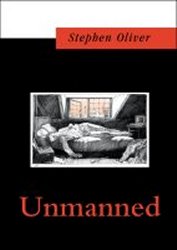
|
Dionysus, progenitor of the lyric poet, has been handed not a goblet of wine, but a score-card! A true respect for the office of poet appears to have been long-abandoned by the versifier. And having come phenomenally thus far in the light of all our advances, I wonder whether there is yet a new way to be surprised at life - its mysteries, if we can still call them that, beyond the prevailing fashions and the dulling of the senses? You will not today, for instance, find a Socrates sipping hemlock in defence of an ideal, or a Diogenes hanging out in a storm-water drain. The Thomas Chatterton myth is a sorry footnote to and parody of the Romantic tradition - at least, in terms of grand passion pitched to the level of vision and the epiphany of belief - to be found contesting failure in the confrontation with self. It is difficult enough to be single-minded in a multiple-choice world. That sort of naivety could never be tolerated these days. |
[Above] Unmanned cover image in full. (Artwork by Matt Ottley, year unknown)
It is no longer a case of the belief behind the act; conversely, it is more a case nowadays of the act behind the guile. You are more likely to find pop lyricists living in penthouse apartments opening doors by remote control and driving keyboards to sophisticated software packages. Victims of the terminal cliches of hype. Poetry has been hijacked by the careerists and ego-terrorists who believe that immortality is equated with fame and the manipulation of other people's emotions and insecurities for real or imagined gain.
These days, the so-called movers and shakers of an earlier poetic generation are now middle-aged anthologists and committee members who have closed ranks, scrofulously occupied in a rear guard action of shoring up defences against exposure en déshabillé as frauds, which every passing day threatens, and are to be found acting as 'pimps', under the influence of O'Hara's shade (or any other recently contemporary, adoptive model) and his merry band of acolytes, in deference to a precocious lack of talent.
With the emergence of the next generation closely dogging their heels, these 'revolutionaries' are soon exposed for what they always were - merely the 'new' status quo waiting patiently in the wings, who must at all costs, and against every challenge to their inherited position, maintain the stance of 'cultural rectitude'. As always, the hard-hitting common sense of Orwell is reassuringly instructive here - in identifying false assumptions based on: '... predicting a continuation of the thing that is happening. Now the tendency to do this is not simply a bad habit, like inaccuracy or exaggeration, which one can correct by taking thought. It is a major mental disease, and its roots lie partly in cowardice and partly in the worship of power, which is not fully separable from cowardice.' To which one might add, stupidity governed by the blindness of arrogance, which is 'not fully separable from fear'.
The prevailing social democratic freedoms in what we like to call the 'civilized world' means that every man and his dog reckons he can lay claim to the title of representative 'poet' [literary politician] should he wish to do so, and such a claim would never be contested because the meaning of the term has long since lost its true value. Unbridled freedom (of expression) breeds meaninglessness in language - but then, it does keep legions of post-modernists assiduously employed in the circular task of intertextual self-promotion: I came, I saw, I signified. The internet has a more reliable memory component in the currency of our day-to-day dealings [Jean Luc Godard has observed, "With digital, there is no past"] and is a greater disseminator of what passes for critical information than any poet today who would dare claim guardianship of the 'pale fire' and historical truth.
We don't want priests or soothsayers, and we can certainly do without the autocratic semiotician, but we do need archaeologists of the spirit. Once upon a time, books meant something. It is rumoured that Orpheus was killed in a rock slide and the Eumenides sacked Parnassus.
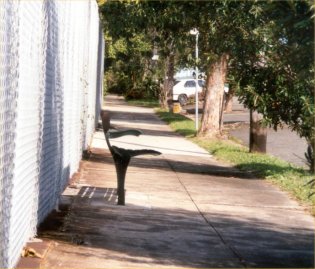
|
from ROMANCES
"With digital, there is no past,"
says Jean-Luc Godard. Either way,
the button is redundant. Voice-command
is thought - the fear deep and futureless
as history, desire to appease which
remains featureless, not the disorganized
weather it truly is, as much a part of
the breathing stars as constancy of rock.
The 'Mr Whippy Man' weaves
Greensleeves in and out of suburbia; a
caravan in search of a trade-route -
via the village that never existed. |
[Above] Urban Poet Series: Public Seating as ballet (Photo by Stephen Oliver, 2002)
The latest reports from the semiotic laboratories inform us, by cypher, that language is a damaged imprint jettisoned by redundant thought processes: idea is the husk of idea, a misprision of perception and misalignment of historical perspective; hyper-real theory in the first instance yet to be constructed. Will the printed word be reduced to a set of algorithms and instruction 'manuals' only accessible on-line? Will the caption replace the plot and the novel, and will the visual image serve as no more than pictographic reference for what once passed for historical continuum? Drink deep of the Cauldron of Forgetfulness. These and other leading questions of the moment appearing daily on a monitor near you. The continuity of thought is deeply fractured, and we are heading into the Gorgon's cave of amnesia. The Gods in disgust have departed through a hole in the ozone until such time as we can again fully embrace fear in all its primal, stark honesty - transmuting it to vision with an hallucinogenic intensity. Only then will nature's Gods enter back through that mirror. Meanwhile, prestige has superseded prescience and the face of poetry has become in many respects a death mask.
Broadly speaking then, the post-colonial world is the world of the bureaucrat - arbiter of systems and mainstay of disinformation, ubiquitous dismantler of histories and cultural legacies. Emerging out of all this, one soon becomes aware that, at least within the New Zealand context [we are insular and smug and we like it that way] the 'land of the long white cloud' is, in effect, a shroud of a more poisonous vapour. [If we can't cope with it, we ignore it]. A deep sense of shame resides in the post-colonial psyche of having been expelled into Eden [by association we must include one other Edenic state, Tasmania, reassuringly known as the 'Apple Isle' and in many ways a closely-guarded literary enterprise, though maybe at times a victim of its own insularity in what Laurence Durrell termed, isle-o-mania] with the brute knowledge gained of damage done, and genocidal crimes committed, in the very act of acquisition. In the final analysis, the formidable Anglo-Saxon reserve (oh, the turning of the worm!) becomes a monument to its own xenophobia.

[Above] Urban Poet Series: Sacred Grotto (Photo by Stephen Oliver, 2002)
We are young enough to remember our guilt but not mature enough to admit it. And this 'exclusivity of denial' - of a people's sense of personal and collective elitism - is gathered from and expressed, or should that be, non-expressed through its 'official' art and literature - with a nationalistic sticker slapped upon it as product. This gives rise to an unconnectedness euphemistically called the 'village mentality', a phrase somehow designed to make such guilt, if not gilt-edged, at least acceptable. Acceptable in the sense that 'cottage industry' is acceptable. The product, however, is a lie and the truth of the matter (for which one should read a sense of identity), is deeply flawed but without that admission.
Such an intractable self-regard can only breed a nationalistic consciousness that is at once neurotic and accumulatively paranoid (and paranoia, after rugby, is a favourite pastime in New Zealand). All is not well in the Garden of Eden, in God's very own real-estate, where the same promotional CDVD plays its mantra in the dream-scapes of the citizens over and over as 'The Anatomy of Amnesia'. The head may be severed from its past but it still talks! In this case, history will not say sorry - but I told you so.
Ask any liberal or national prime minister of the day. Yet never expect the truth from any winery-sponsored, 'poet laureate of the year' (from his elevation, the world is a sweet-meadowed place) whose poetic utterances are only required to meet the needs of any air-brushed life-style or 'House & Garden' magazine, and corporate sponsored wine festivals, where the Dionysian investiture has all the relevance of a liveried, car-park attendant.
About the Writer Stephen Oliver
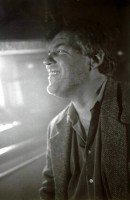
|
Stephen Oliver was born in Wellington, New Zealand in 1950 and grew up in Brooklyn-west. He was educated at Marist Brothers, Newtown and St Patrick’s College, Cambridge Terrace. He subsequently completed a one year diploma course in magazine journalism at Wellington Polytechnic. He has lived in Greece, Paris, Vienna, London, San Francisco, and Israel, where for a few weeks he worked as a broadcaster on the radio ship,‘The Voice of Peace’ in the Mediterranean out of Jaffa. He has operated in the radio and television industries as a production voice, newsreader, announcer, copy and features writer usually in a freelance capacity. Stephen Oliver is a transtasman poet based in Sydney, Australia. |
[Above] Photo of Stephen Oliver by photographer unknown, 1997.
I Next I
Back I
Exit I
Thylazine No.3 (March, 2001) |



